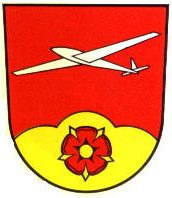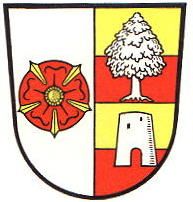Oerlinghausen: Difference between revisions
Knorrepoes (talk | contribs) m (Text replacement - "{{media}}" to " {{de1}} {{media1}}") |
Knorrepoes (talk | contribs) m (Text replacement - "{{de}}" to "") |
||
| Line 1: | Line 1: | ||
'''OERLINGHAUSEN''' | '''OERLINGHAUSEN''' | ||
Revision as of 05:10, 27 December 2022
OERLINGHAUSEN
State : Nordrhein-Westfalen
District (Kreis) : Lippe (until 1972 Lemgo)
Additions : 1969 Helpup (1957 Mackenbruch, Währentrup, Wellentrup (partly)), Lipperreihe
| German |
In Rot ein silbernes Segelflugzeug. Im Schildfuß ein goldener Dreiberg, belegt mit einer roten fünfblättrigen Rose mit goldenem Butzen und goldenen Kelchblättern. |
| English | No blazon/translation known. Please click here to send your (heraldic !) blazon or translation |
Origin/meaning
The old arms were granted on June 7, 1926, the new arms in 1978.
The old arms are based on the rose of Lippe and the arms of Paderborn (below).
The town was ruled by both the Princes of Lippe and the bishops of Paderborn. On the Paderborn arms two additional symbols are added; the tower is an old windmill, which is a typical landmark in the town. The tree represents the situation of the town in the Teutoburger Wald (forest).
As Europe's biggest gliding field is located in Oerlinghausen, the glider plane was included in the new arms. Oerlinghausen sometimes calls itself "Stadt der Segelflieger" which means "city of glider pilots". The rose of Lippe and the hills of the Teutoburger Wald remained.
Literature: Stadler, K. : Deutsche Wappen - Bundesrepublik Deutschland. Angelsachsen Verlag, 1964-1971, 8 volumes, and <a href= http://www.oerlinghausen.de>Oerlinghausen web]].

